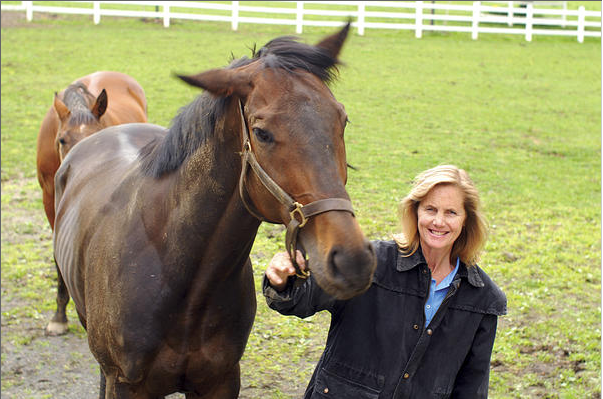
A horse rescuer who saves thoroughbreds headed to slaughterhouses

Sarah Beth Glicksteen/Special to The Christian Science Monitor
By Margaret Guthrie, The Christian Science Monitor |
Little girls often fall in love with horses. Erin Hurley did at age 8 when she learned to ride. Her mother gave her a horse of her own when Erin turned 10.
“My mom paid $200 for him,” Ms. Hurley recalls. “Bucky was my first love.”
Not every little girl, however, grows up to translate that first equine love into the kind of action that in the last two years has resulted in the rescue and adoption of more than 250 thoroughbred racehorses. The racing careers of these horses, mostly 3 to 5 years of age, ended for various reasons, including injuries. Through Hurley they’re getting a chance at a good, useful life beyond the racetrack.
Horses that can no longer race often end up at auction in what are called “kill pens.” From there they are loaded into trucks and driven into Canada or Mexico to slaughterhouses.
Though horse meat is rarely consumed in the United States, it is still widely eaten elsewhere, not only in developing countries but also in Japan and parts of Europe. Racehorses make excellent horse meat since they are in prime condition and very muscular.
Ending up on a dinner plate means a short and undignified life for these beautiful animals, in Hurley’s opinion. “My passion has always been to rescue and retrain racehorses off the track,” she says. “I have always been impressed by their athleticism and heart.”
Hurley’s whole working career has been with horses. She opened, and for 18 years ran, a therapeutic riding school called Unicorn.
“We had a hundred kids with cognitive and physical disabilities from four agencies here in southern New Jersey,” she says.
During that time, Hurley was also competing in Three Day Eventing, a challenging contest for horse and rider that evolved from the training cavalry officers received. Hurley’s horses in the competition were often those she had saved from the racetrack.
After phasing out Unicorn, she founded South Jersey Thoroughbred Rescue & Adoption (SJTR&A), a nonprofit group. With the help of her son, Jonathan, she created a website (www.sjtbadoption.org) where she posts photos of horses available for adoption, along with stories of those who have been adopted.
She also teams with Turning for Home (TFH), a racehorse rescue program at Philadelphia Park, a racetrack across the Delaware River in Bensalem, Pa.
“I don’t know what I would have done if I had not connected with Turning for Home,” Hurley says. “I don’t know how some of these smaller rescue and adoption outfits make it because [we were] constantly in the red until we connected with Philadelphia Park.”
TFH has become a national model for keeping racehorses from the slaughterhouse. The track’s management makes a sizable donation each year, and each owner whose horse enters the starting gate pays $10, which goes to TFH. Each winning jockey also contributes $10 and each second-place jockey $5.
This provides about $15,000 a month, TFH director Barbara Luna says, which she uses to place horses for adoption. She finds homes for 10 to 12 horses every 30 days and has a two-week waiting list.
“I don’t know where this program would be if I hadn’t made the connection with Erin,” Ms. Luna says. “Before I knew about her, I worked with a couple of others and they drove me nuts because I could never find out where the horses were, who had them, and what kind of shape they were in.”
“A horse that’s rescued must be rescued for life,” points outs Mike Ballezzi, executive director of the horsemen’s association at Philadelphia Park. “That’s why follow-up is so important.”
Both Luna and Hurley have kept track of all the horses that have moved through SJTR&A. Six months after adopting, the new owner must present them with a veterinarian’s report on the horse’s current health and well-being. Hurley herself inspects boarding facilities and makes sure the horses are properly shod to maintain foot health.
Tara Weston-Brick is one of the happy horse-adopters. “I adored horses as a girl and got a mare for my 13th birthday. I rode her until I was 18 and went away to college,” Ms. Weston-Brick recalls. But her parents couldn’t afford to pay for college and keep a horse.
“I always knew I would own another horse one day and told my husband to be prepared for it when we were first married,” she says. She saw a local TV news item about the TFH program. “That Friday, I went to see [a horse], and one look was all it took,” she says. “He’s given me a new beginning with horses; he’s just a really great horse.”
Though many racehorses still end up as horse meat, Hurley feels she is making a difference. “I would like to save them all,” Hurley says, “but that’s just not possible. You have to be realistic about the process. It has to be run like a business, because it is.”
“I am just amazed at how efficient [Hurley] is,” says Debbie Whitesell, who owns a farm in Moorestown, N.J., that is leased to SJTR&A, where horses wait for adoption. “I am so happy to see [our] paddocks full again, and this is such a wonderful cause.”
Most horses are adopted within a week of their arrival, some within 24 hours. Those whose careers ended because of injury may wait longer because they are first treated and given time to heal.
Veterinarians devote volunteer time to the program, too. They include Patty Hogan, who gained national fame as the equine surgeon who treated Smarty Jones, the racehorse who won two legs of the Triple Crown in 2004 after severely injuring his skull in a training gate accident as a 2-year-old.
“I am fortunate to have an incredible core of volunteers who work with me, and a supportive husband and kids,” Hurley says.












